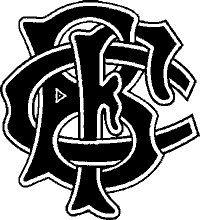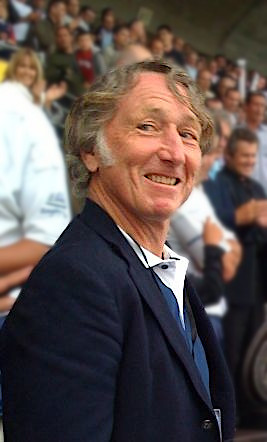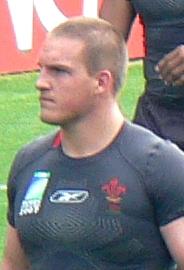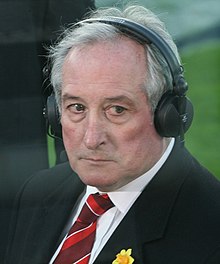
Barry John was a Welsh rugby union fly-half who played in the 1960s and early 1970s during the amateur era of the sport. John began his rugby career as a schoolboy playing for his local team Cefneithin RFC before switching to the first-class west Wales team Llanelli RFC in 1964. Whilst at Llanelli, John was selected for the Wales national team—as a replacement for David Watkins—to face a touring Australian team.

Philip Bennett was a Welsh rugby union player who played as a fly-half for Llanelli RFC and the Wales national team. He began his career in 1966, and a year later he had taken over from Barry John as Llanelli's first-choice fly-half. He made 414 appearances for the Scarlets over the course of a 15-year career he scored 131 tries, 43 drop goals, 293 pens and 523 convs. He made his Wales debut in 1969, but it was not until John's retirement from rugby in 1972 that Bennett became a regular starter for his country. He led Wales to the Five Nations Championship title, including the Grand Slam in 1978, which culminated with his retirement from Wales duty.

The Barbarian Football Club, known as the Barbarians, is a British-based invitational rugby union club. The Barbarians play in black and white hoops, though players wear socks from their own club strip. Membership is by invitation. As of 2011, players from 31 countries had played for them. Traditionally at least one uncapped player is selected for each match.

John Peter Rhys Williams was a Welsh rugby union player who represented Wales in international rugby during their Golden Era in the 1970s. He became known universally as J. P. R. Williams four years after his Welsh debut, in 1973 when J. J. Williams joined the Welsh team.

The Wales national rugby union team represents the Welsh Rugby Union in men's international rugby union. Its governing body, the Welsh Rugby Union (WRU), was established in 1881, the same year that Wales played their first international against England. The team plays its home matches at the Millennium Stadium in Cardiff, which replaced Cardiff Arms Park as the national stadium of Wales in 1999.

Cardiff Rugby Football Club is a rugby union club based in Cardiff, the capital city of Wales. The club was founded in 1876 and played their first few matches at Sophia Gardens, shortly after which relocating to Cardiff Arms Park where they have been based ever since.

Gavin Lloyd Henson is a Welsh former professional rugby union player, who played as a fly-half, fullback and inside centre.

Gethin Jenkins is a Welsh former professional rugby union player who played as a prop for Pontypridd, Celtic Warriors, Cardiff Blues and Toulon. At international level, he won 129 caps for Wales. On his 105th appearance in 2014, he became Wales' most-capped player, overtaking the record held by Stephen Jones; having earned his final cap in November 2016, his record was surpassed by Alun Wyn Jones in September 2019. He is one of a small group of Welsh players to have won three Grand Slams. He also won five caps for the British & Irish Lions on three tours in 2005, 2009 and 2013. He is the sixth most-capped player in rugby union history and the most-capped front-row forward.
Thomas Gerald Reames Davies CBE DL is a Welsh former rugby union wing who played international rugby for Wales between 1966 and 1978. He is one of a small group of Welsh players to have won three Grand Slams including Gareth Edwards, J. P. R. Williams, Ryan Jones, Adam Jones, Gethin Jenkins and Alun Wyn Jones.

Ryan Paul Jones is a Wales former international rugby union player who played at number eight, blindside flanker or second row. He was involved in three Grand Slam wins, in 2005, as captain in 2008, and 2012. He is one of a small group of Welsh players to have won three Grand Slams including Gerald Davies, Gareth Edwards, J.P.R. Williams, Adam Jones, Gethin Jenkins and Alun Wyn Jones.

Shane Mark Williams, is a Welsh former rugby union player most famous for his long and successful tenure as a wing for the Ospreys and the Wales national team. He also played scrum-half on occasion. Williams is the record try scorer for Wales, and is fourth on the international list of leading rugby union test try scorers behind Daisuke Ohata, Bryan Habana and David Campese.
Clifford Isaac Morgan, was a Welsh rugby union player who played for Cardiff RFC and earned 29 caps for Wales between 1951 and 1958. After his playing career ended, Morgan made a successful career in broadcasting, both as a commentator and presenter and also as a programme-maker and BBC executive.

Martyn Elwyn Williams, is a Welsh former professional rugby union player who played as a flanker. He earned 100 caps for the Wales national team, the most by a forward until he was surpassed by Gethin Jenkins in November 2013. He remains Wales's most-capped back-row forward. He also played for the British & Irish Lions, touring Australia in 2001, New Zealand in 2005 and South Africa in 2009. Overall, he played 17 times for the Lions across the 3 tours scoring 2 tries which included 4 test matches.

Alun Wyn Jones is a Welsh former international rugby union player who played as a lock. He played most of his career for Ospreys and for the Wales national team. He is the world's most-capped rugby union player, with 158 caps for Wales and 13 for the British & Irish Lions, and also holds the records for the most Wales caps and the second most Wales caps as captain. He retired from rugby in 2023.

Joshua Turnbull is a Welsh former professional rugby union player, who played in the back row and second row. He played for the Scarlets and Cardiff Rugby in the United Rugby Championship, and at club level for Carmarthen Quins, Llanelli and Llandovery. He played internationally for Wales at under-16, under-18, under-19 and under-20 levels, and earned 13 caps for the senior team between 2011 and 2022. Born in Haverfordwest, he is a fluent Welsh speaker.

Samuel Kennedy-Warburton, OBE MStJ, commonly known as Sam Warburton, is a Welsh former international rugby union player. Warburton played rugby for Cardiff Rugby and was first capped for Wales in 2009.
William Gwyn Hullin was a Welsh international rugby union scrum-half who played club rugby for Cardiff and London Welsh. He represented the Barbarians and played county rugby for Surrey and the London Counties. Hullin was capped only once for Wales, being unfortunate to be playing at the same time as Gareth Edwards, one of the greatest scrum-halves in world rugby. Despite his lack of international caps, he was a regular first team club player, and toured overseas, with Cardiff, London Welsh and the Barbarians. He was also a successful Sevens player, finishing in the winning team in both the Snelling Sevens and the Middlesex Sevens.

Hallam Benjamen Amos is a former Welsh rugby union player who played for Cardiff Rugby and Newport Gwent Dragons. He mostly played as a wing, but he was also capable of playing at fullback and as a centre. In October 2021, Amos announced his retirement from professional rugby union to focus on his medical career.

As part of their tour to North America and Europe in 1972–73, the New Zealand national rugby union team played the Barbarians at the National Stadium in Cardiff in their last match in Great Britain. It is considered to be one of the best rugby union matches ever played, and featured what has been described as "the greatest try ever", scored by Gareth Edwards in the first few minutes. The Barbarians won the game 23–11. It was the first time New Zealand lost to the Barbarians.


















